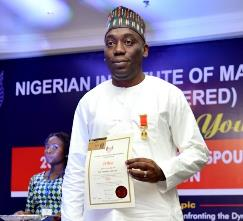By Muda Yusuf
Protocols
I am delighted to be here this morning to share my perspectives on the theme of this breakfast meeting with a very distinguished audience and stakeholders in the maritime sector. Let me also express my appreciation to the Maritime Reporters Association of Nigeria (MARAN) for inviting me as keynote speaker.
As a country, we are yet to appreciate the full significance of trade and the international trade ecosystem as leverage for economic transformation. This perhaps explains why trade issues have not attracted the level of attention commensurate to its contribution to the economy. The trade sector accounts for 16% of our GDP in 2023 which amounts to over N27 trillion. But this data reflects largely domestic trade – that is wholesale and retail trade. The contribution of international trade and the entire ecosystem is yet to be adequately captured in our GDP data. This is what the maritime sector or the blue economy represents. I am hoping that as the GDP is rebased, this grave shortcoming in our economic data will be corrected.
What we have in the National Bureau for Statistics (NBS) data is water transport. But the maritime sector or blue economy is beyond just water transportation. Water transport, for instance, contributed a mere N12.6 billion in 2023 which was 0.01% of GDP. This certainly cannot be what the maritime sector contributed in the whole of 2023. And this has been the trend over the years.
The maritime sector handles over 95% of our international merchandise trade. The value of trade in 2023 was N71.9 trillion in 2023, with import accounting for N36 trillion and export accounting for another N36 trillion.
The theme of this breakfast meeting is Trade Facilitation and President Tinubu Economic Agenda: Matters Arising.
The eight-point agenda of the administration is as follows:
food security; poverty eradication; growth, job creation; access to capital; inclusion; rule of law; and fighting corruption.
The fact is that there is a large intersection between trade facilitation and the eight-point agenda. Without a seamless international trade process, it would be difficult to deliver the desired outcomes for the agenda. This is so because there is import or export content in every pillar of the agenda. This is also the reason the President at his inaugural address after swearing stress the need for an improved internal trade process. The point we are making is that trade facilitation has a big role to play in driving the realization of the renewed hope agenda.
Concept of Trade Facilitation
This concept is essentially about ensuring minimal impediments and costs in the international trade process, whether it is import or export. The essence is to ensure that we make our economy competitive through cost reduction in the international trade process. There are multiple dimensions to the issue of trade cost:
Shipping Costs
Demurrage
Storage Fees
Interest Costs
Insurance Cost
Haulage Cost
Container Costs
Import Duty
Regulatory Fees
Levies and Taxes
Corruption Costs
The conversation about trade facilitation should therefore be about how we can reduce these costs. These are our key objectives. The question is how can this be achieved? There are some essential pillars of trade facilitations.
Role of the Nigeria Customs Service
The Nigeria Customs Service has a major role to play in the trade facilitation process. It is worthy of note that the service has taken some giant strides in this regard. The Comptroller General of the Nigeria Customs Service recently launched the Time Release Study [TRS] to track the government of relevant documentations to determine areas of delays and bottlenecks in the cargo clearance process. This is a World Customs Organization to track the cargo clearance processes that is been domesticated by the Nigeria Customs Service.
There is also the Authorized Economic Operators [AEO] is processes designed to incentivize and reward compliance in the cargo declaration processes. It is a risk-based approach to cargo clearing which paves the way for speedy release of cargo to compliant operators which is based on their track record. This is also a major initiative to boost trade facilitation and encourage compliance.
Pillars of Trade Facilitation and Reform Imperatives
Let me now highlight some critical pillars of trade facilitation and reform imperatives.
*Being excerpts of a keynote address presented by the Chief Executive Officer (CEO), Centre for the Promotion of Private Enterprise (CPPE), Dr. Muda Yusuf at the breakfast meeting organized by the Maritime Reporters Association of Nigeria (MARAN) at Rockview Hotel, Apapa, Lagos…recently.











